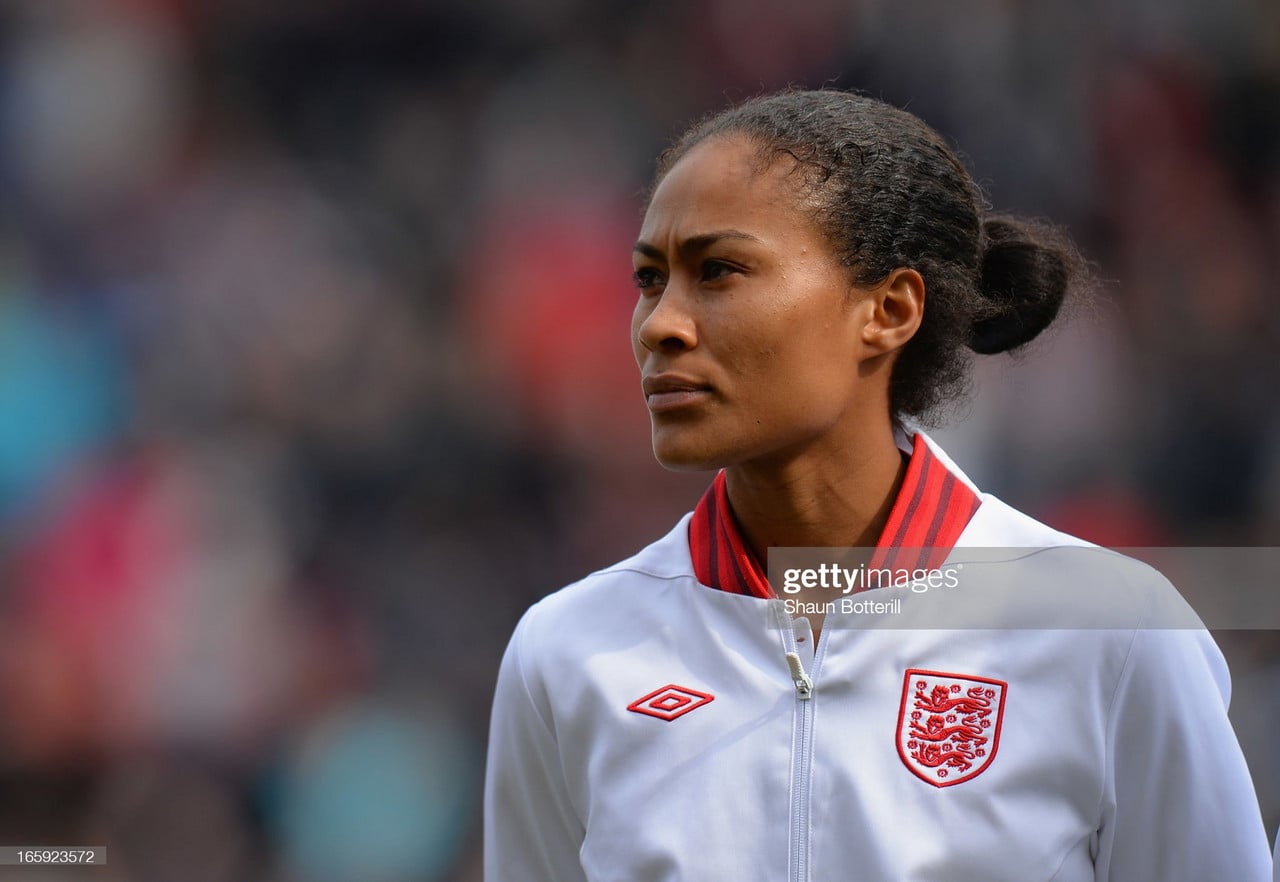Hard on the heels of a landmark review, which has called for wholesale change across the women's game, from enhancing minimum standards for professionals to 'rapid growth' in the development of young talent, is a swathe of support towards the strive for transformative action.
The review, chaired by former England international Karen Carney, is another step in the right direction to improve the sport's equality and promote a brighter future.
She argues that to finance necessary adaptations, new solutions must be considered, including allowing women’s football to be broadcast at 3pm on a Saturday and raising prize money in the women’s FA Cup to match the men’s competition.
By releasing the review to the public, Carney has already sparked conversation across the country. Of those to voice their support for the changes is ex-England and Arsenal teammate Rachel Yankey.
"The review, Karen’s done a lot of work on that, and I think a lot of people have spoken to her, wanting to push the game on," she told VAVEL. "It’s made vast improvements [the women’s game], but we still want to keep progressing to make it better."
-
An equal game is a good game
At the core of Yankey's ideals for the women's game is the expansion of opportunity. While Carney focussed on logistics, her teammate relayed the message that football is for everyone.
"Where women’s football is at, it’s in a very good place. But it could be so much better. I still think there’s room to give more people an opportunity in the game, every young girl, no matter of their background, and there’s still lots to gain in terms of grassroots football. We need to reach out to more people and more youngsters."
This is only achieved when all levels of the sport are given equal attention, with the top level paving the way for higher standards and merit to filter through the rest of the divisions - all the way down to pre-teen involvement within schools and at grassroots level.
One of the suggestions that Yankey made at an elite level was that stadiums should be improved so that more people can watch and get involved.
But while Chelsea and Arsenal played all of their Champions League knockout games at Stamford Bridge and Emirates Stadium, with the promise that both will increase their playing time at the traditional 'men's' grounds next season, there is still a problem where long-term options of National League stadia are insufficient in meeting the sharp rise in the sport's popularity.
"At professional level, we need to improve stadiums. In the WSL, we’re seeing bigger attendance figures, but we struggle with the consistency of that. We have the difficulty, at the moment, also, where teams, such as Chelsea and Arsenal, are outgrowing their current homes.
Yankey's former team Arsenal, where she became one of the most decorated English footballers of all time, broke the British attendance record for a Women's Champions League tie last season when they welcomed Vfl Wolfsburg to north London in the semi-finals.
The problem, however, stems from when clubs neglect to promote the following fixture at a smaller stadium that plays host to seemingly a lesser-known competition, creating the blurred notion of insignificance.
"What do we do? Because going from a 3,000, 4,000-seater to a 30,000+ seater, that’s a big leap. You kind of need something in between, but I’m not sure we have the facilities for somewhere in between."
Within Carney's review, it cites a submission from the FA observing: “Central investment from the Premier League into men’s academies is £88m per annum compared to the overall FA budget for women’s academies of £3.25m per annum”.
Significantly, the size of stadiums is prohibiting the growth of the women's game, with arguments as to why men get paid more falling on the restriction of opportunity.
Yankey finalised her own list of changes she'd made by talking about the quality and diversity of coaches. She continued to evoke the sentiments of an equal game: "We need more coaches from different backgrounds."
"We also need coaches of different ethnicities because this helps with support and understanding of younger players. I think that is really important.
"But I am sure the review Karen did has looked at all this in more depth, and hopefully, people are, and will continue to, buy into this, and support the players more so we have a better future for those youngsters compared to five or ten years ago.
"Effectively, we must build so that the next generation carries the torch to even more progress than what we have already made. It’s in a good place, but it could be a lot better."
-
Busy transfer window underlines financial progress
As Yankey described the women's football landscape, she made it clear that all wasn't bad. The former Lioness jumped at the bit when given the opportunity to talk about the excitement this summer's WSL transfer window has produced.
The belief that the women's game has undergone a post-Euros boom in competitiveness was underpinned by Yankey's thoughts on this year's dealings, paying particular notice to the Alessia Russo transfer from Manchester United to Arsenal.
"It’s [the transfer window] been really exciting. Obviously, as an Arsenal fan, the key signing for me has been Alessia Russo. I think Arsenal made a massive statement with their interest at the start of the year, and so did Manchester United at the time by rejecting the bid and showing it was so important to keep her.
"That initial offer showed that there is money and investment in the game, which is always pleasing to see. Clubs can see the importance of bringing talents into their women's squads now, whether that be players from abroad or those already in the country."
While Yankey was unsure how to approach the question of whether Man Utd's talismanic striker was a needed transfer for the Gunners, with a star-studded attacking lineup already boasted by the north London club, she looked at the domino effect that it has had on the rest of the WSL.
In past seasons, the sale of household names made the headlines in the WSL postseason. The departures of fellow lionesses Lucy Bronze, Georgia Stanway, and Keira Walsh, alongside top-class foreign talents Caroline Weir and Jill Roord showed that the grass was greener on the other side.
However, that narrative has changed. Now, the bigger names want to move to England. Roord's return to the country emphasises a shift in perspective, as well as high-profile signings from clubs whose ambitions have traditionally strayed beneath that of Chelsea, Arsenal, and the Manchester clubs, offering an insight into the future of the women's game.
"Other clubs didn’t see that as a priority [investing in the women's team on a competitive level]. But I think that has changed recently, teams like Everton, Aston Villa, and even Brighton now – they are heavily investing in their club, that sort of one-club atmosphere.
Having barely escaped the dropzone, finishing second-bottom with four wins, no team has exemplified the rise in the WSL transfer market more than Brighton. Their strong pulling power has acquired the services of Pauline Bremer, Vicky Losada, and Madison Haley, players already known to fans before they made the switch.
"They’ve realised that it’s not about the women’s game, it’s about what the club can do together, as a whole. I think that has been so important for the rise of the women’s game. When one club acts equally, it sends a different signal to your fans.
"For example, if you support the men, you should also support the women, because we are the same club."
-
Arsenal set the standard
As a girlhood Arsenal fan whose dreams of playing for the club came true, Yankey most likely could never say a bad word about the North Londoners. But it just so happens that she has never needed to either, as they have led the way to change.
Even during her playing days, Arsenal's initiative of a one-club mentality was prevalent. After expressing her joy about the Alessia Russo transfer, the nine-time FA Cup winner justified that the recent domino effect in the window boils down to the Gunners' influence.
"Arsenal always set a standard," she explained. "This isn’t just in the money sense, but also the values at the club, which goes all the way back to when I was part of that squad as well.
"Everything at the club has always been at the highest standard. Even things such as the hotels we were staying in, everything was of a level we deserved. It is just unfortunate that wasn’t the case for other teams around us at the time.
"When I go to men’s games, people recognise me, and back when I was playing, they had full support of my team. Not just because we were successful, but also because the standard was set, and that is happening with other teams in the country now."
*This interview is brought to you by betway. Please gamble responsibly. GamCare offer a free and confidential service for those who may require further support*


